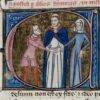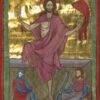Category: Evangelical Calvinist
Writings from the blog: Athanasian Reformed (aka The Evangelical Calvinist). Senior Reformed scholars present a coherent and impassioned articulation of Calvinism for today’s world.
The Church’s ecstatic Existence and Evangel[istic] Mandate
The Church is for the world, because God in Christ is for the world: For God so loved the world that He gave His only begotten Son, that whosoever believes in Him will not perish, but have everlasting life. -John 3:16 The Gospel gives us life eternal; the Gospel is God’s life for the world, for us, in Christ; thus, genuine life, of the eternal type, of God’s triune type, comes ecstatically to us. It comes to us from the vicarious humanity of Christ as ‘He becomes us that we might [by grace] become Him, and share in the superabundance…
Sin as Primarily Relational Rather than Forensic
Often you will see me emphasizing the sin/grace matrix as a relational rather than a purely forensic reality. This bears out only if the One we have sinned against is in fact a personal rather than monadic law-like being. Sin is personal and relational because, first, God is a relation of triune persons. At root our relationship to Godself is indeed based upon the correspondence God has first (before the foundations of the world) established for us in His imago Dei (cf. Col. 1.15), in His free and gracious election to be with us in the vicarious humanity of Jesus…
Looking Past the Theologians to God’s Theologian for the World
As is well established by now, I have struggled with reading Karl Barth because of his unrepentant lifestyle. But the reality, which is also well noted by many, is many of our most cherished Protestant and otherwise theologians from the past were also sinners; even to the point of dying in unrepentance. For me what’s really at issue is mining the past, from wherever it comes, insofar that that past can help illuminate, imaginate, and faithfully bear witness to King Jesus and the triune God. The scholastics Reformed had a way of doing what they called ‘reverential exposition.’ They would…
The Miracle of the Gospel as Theological Ontology-Epistemology
The Gospel, the Incarnation is a miracle not of this world. This is why abstract philosophical constructs cannot handle the weight of the Gospel, they end up distorting it. The Gospel comes with its own rationality, one that is funded by the miracle of the Incarnation. The rationality of this world, of the type that the ancient philosophers have developed, cannot scratch the surface of the miracle of the Gospel. The world and all of creation is contingent upon this miracle, the Gospel; the world was created for the Gospel, not the other way around. As such, in order to “discover” the…
What is Federal or Covenantal Theology? Per Caspar Olevianus
The following is a blog post I first posted in September 18th, 2009. I posted this at another blog of mine from back in the day. I think what is really important to understand is that if the student doesn’t understand the entailments of classical Federal or Covenantal theology, they won’t grasp the weight of what we are offering as an alternative and counterweight in Evangelical Calvinism. Evangelical Calvinism isn’t actually a counter to five point Calvinism, per se; but instead, it is a counterweight to the thicker theology behind five point Calvinism as that developed in the Post Reformed…
No Vision or Knowledge of God without God’s Holiness: The Role Christ’s Sanctification for Us Plays Towards Having Genuine Knowledge of God
Εἰρήνην διώκετε μετὰ πάντων, καὶ τὸν ἁγιασμόν, οὗ χωρὶς οὐδεὶς ὄψεται τὸν κύριον, Pursue peace with all people, and holiness, without which no one will see the Lord . . . Hebrews 12:14 ὄψεται (lexeme: ὁράω), translated in the NKJV above as ‘will see’ is in the future tense third person middle indicative. I have a theological-exegetical theory: P1. Divine holiness and peace are required in order to have vision and knowledge of God. P2. Knowledge and vision of God are eschatological realities available now and for eternity to come. P3. Only Jesus Christ for us has divine holiness and peace to…
In Defense of Lonnie Frisbee’s Salvation; In Defense of Salvation for All
I was planning on writing a blog post on what death is; what Incarnation Anyway entails; and life everlasting. But for lack of energy, and time at the moment, I am going to simply post three separate Facebook/Twitter posts I just posted; as you’ll see they are thematically related. It was really prompted by a video I just watched made by Lonnie Frisbie’s best friend. If you don’t know, Frisbee was the catalyst that started the ‘Jesus People’ movement with Pastor Chuck Smith at Calvary Chapel Costa Mesa back in the late 60s early 70s. As an aside: I attended Calvary Chapel…
Against Speculative Scholastic Theologies: For Confessional Cruciform Theologies
Being a genuine Christian theologian starts at the point that we become Christians. The same confession made to become a Christian, is the same confession that remains as the ground of our theological witnesses as Christians. The fact of our sin never leaves us. We are constantly sinning, and the person who says otherwise “is a liar and the truth is not in them.” But the Good News, indeed, is that we have an Advocate with the Father; we have a Savior, and His name is Jesus Christ! This is the ground of all Christian theologizing; the only other ground…
How’s the Font Size?
Let me know if this new font is too small, and thus hard to read. Thank you. Athanasian Reformed
A PDF of what I turned in for the Dissertation
Here is what I presented as my dissertation by prior publication to Concordia Academic Theology Consortium, Intl. As noted, I have given the PhD back, but here is the work I presented to Dr. Enrique Ramos and Dr. Fred Macharia for examination. It really was just a coalescing together of what I had already written; whether that be published in book form, or various blog posts strung together. It is what it is. Click here: Evangelical Calvinism’s Portrait of a Knowledge of God and a Sure Salvation. Like I also said: I am still happy to have the honorary DTh from CATC, but…
![The Church’s ecstatic Existence and Evangel[istic] Mandate](http://protestantbeliefs.com/wp-content/uploads/2023/03/holyspiritdove1-100x100.jpg)






